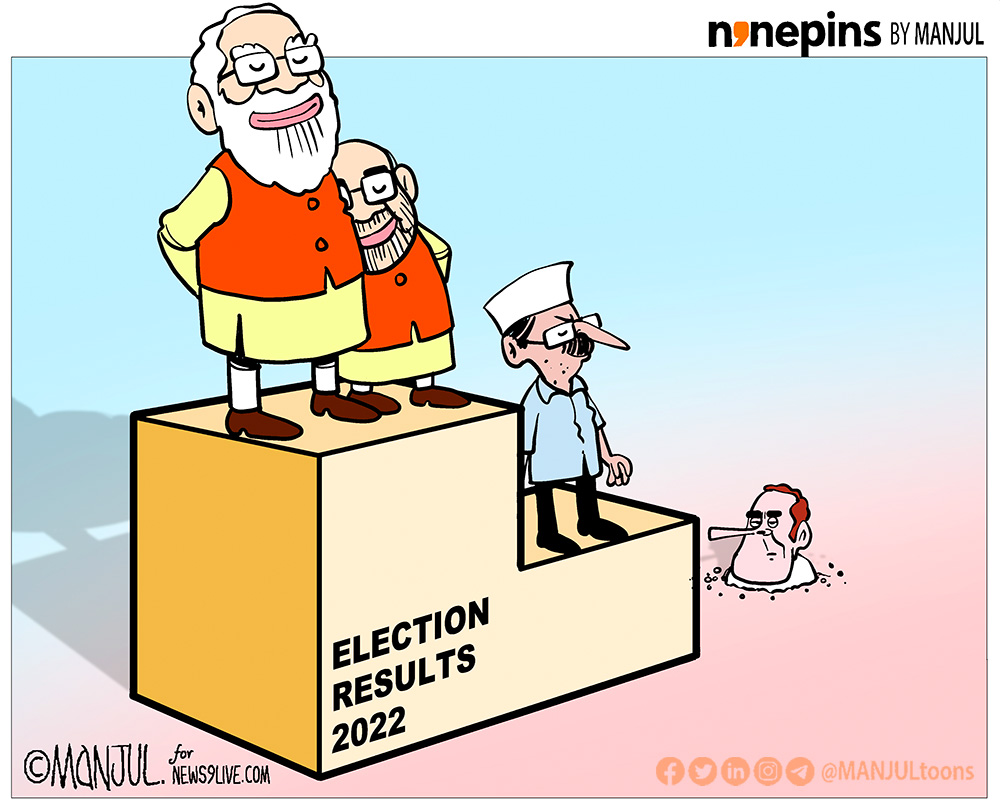The long election season in India came to an end last week and the results are in line with my forecast in all states except Goa where I thought that BJP will be shunted out this time.

We have been fed with a surfeit of analyses and takeaways by commentators of all hue by way of articles, videos and podcasts. I don’t want to further add to that cacophony by posting my takeaways on the election results. However, I am unable to resist listing my key takeaways on the takeaways of the experts themselves. And here we go:
- “Switch” Bharat Abhiyan doesn’t stick: Just before the elections were announced in the UP, we saw a big number of defections mostly from the BJP to SP. These were interpreted by pundits as a pointer to the way the political wind was blowing. In the end however, out of the 21 turncoats who shifted from BJP to SP just before the polls, only 4 won. The big name among this was Swami Prasad Maurya who hogged headlines for at least a week. He lost his own seat. So, the message is, when leaders leave a party just before polls claiming to have not been given justice blah, blah, the reality could be different. They might have sensed that the party may drop them from the contestants list due to their poor performance. We saw this in Bengal also when few leaders jumped from TMC to BJP and they all mostly lost. Swachh Bharat Abhiyan may still be a work In progress but, this “Switch” Bharat Abhiyan is mostly still born!
- Differentiate between “Voting” public and “Vocal” public: Reporters doing ground reports often get carried away by the “Vocal” electorate and come to a conclusion for the entire “Voting” electorate. Here, I would like to give an analogy from marketing. When a product or service doesn’t meet the consumer’s expectations, it is very common for him/her to put it out on social media or talk to others about it. But, when the product or service is good and meet the expectations, consumers seldom talk to others or post a review. Negative WOM (Word of Mouth) always trumps positive WOM. It is the same case with voters, I feel. There could be those voters who are not happy with a party and hence tend to be vocal in front of the camera. But, there could be a larger section of voters who could be happy with a government and don’t bother to say anything to reporters. Coming to a conclusion in favour of the vocal public like many commentators did in the recent UP elections is fraught with a high probability of going wrong.
- Covid is not Government’s creation: In the run up to the polls and even later, we kept hearing experts talking about how UP government mismanaged Covid and how people will vote out the incumbent BJP government because of that. My point is, if Covid was mismanaged, it was mismanaged by all countries, all states and all administrations all over the world. I don’t think there is any administration that came out covering itself in glory in managing Covid. Even in India, if UP mismanaged Covid, so did Delhi, Kerala, Punjab, Tamil Nadu and so on. But commentators were rifle focussed in talking about Covid mismanagement only in UP while not referring to the same in other states. And the larger point is, the common public did not think that Covid was a creation of the Modi Government at the centre or for that matter any state government. Even in West Bengal elections or in Bihar elections, at the peak of the first wave, people did not punish the incumbent governments over Covid. I think there is a clear resignation among public that Covid was a pandemic not created by the governments and that the governments were trying to do their best with their backs against the wall.
- Pro-Incumbency doesn’t mean Anti-Incumbency is over: Since BJP won 4 out of 5 states in this round and sort of retained power in all these states, there is an opinion that the time of Anti-Incumbency is over and it’s the time of Pro-Incumbency. Well, this is only partially true in my opinion. Anti-Incumbency is over only if the incumbent is not Congress. The Congress still manages successfully to succumb to Anti-Incumbency in the states they rule. I am not saying this just because Congress lost Punjab this time where it was incumbent. In the recent past, Congress managed to lose power in states like Pondicherry (2021), Karnataka (2018), Tripura (2018), Himachal Pradesh (2017) and so on. Yes, other parties have learnt to overcome Anti-Incumbency by mastering the art of governance and delivery like TMC in Bengal (2021), LDF in Kerala (2021), AAP in Delhi (2020), BJD in Odissa (2019), BJP in Gujarat (2018) and now in four states to sight a few examples. But not the Congress. There is not a single state where Congress has managed to retain the state by demonstrating good governance and thereby projecting a case for Pro-Incumbency. The antithesis from here is that unlike in the past when Anti-incumbency was peddled as an acceptable excuse for losing power by an incumbent government, presently, Anti-Incumbency cannot be an acceptable ruse for a defeat.
- Marketing works only if the product is half good: In the beginning of the UP campaign, commentators were talking of how Priyanka Gandhi was running an exceptional campaign in UP with women at the core of the pitch. ‘Ladki hoon, lad sakti hoon’ (LHLSH) was hailed as a brilliant campaign. We now know the outcome of that campaign. Even during the campaign, key women faces of the program jumped ship. Any great campaign cannot save a poor or an average product. So, I was surprised that commentators were getting carried away by the LHLSH slogan and were expecting Congress to make an impact. To me, it was of no surprise that the campaign lost steam midway. Same can be said of TMC in Goa where the marketing muscle and resources couldn’t muster a single seat.
- In Election Arithmetic, 1+1+1 is not 3: Too many commentators have this habit of summing up individual party’s vote shares in the previous elections to forecast the vote share of an alliance in future elections. As we have seen repeatedly, 1+1+1 need not be 3. It can be 4, if the alliance is on the right side of winning and can be 0.5 if it’s the wrong side of winning. For example, just because RLD tied up with SP this time, the entire JAT vote didn’t shift to SP combine as we were told by experts.
- Day-today issues Vs Electoral issues: Increasingly I am seeing that reporters and experts talk to people on the streets on their issues and tend to conclude that they are key “electoral” issues based on which voters would eventually vote for a party. For example, in UP, commentators were talking of “stray cattle” as a big poll issue going against the BJP government. It is obvious to anyone as daylight that BJP as a party will never get punished for an issue like “stray cattle” that too when Yogi Adityanath who has been a votary of Cow protection is the Chief Minister. Also, can anyone tell me when Mehengayee (Price increase) and Berozgaari (Unemployment) have not been issues in India? These have been perennial issues in India and at least in the last 30 years, voters have not started voting for or against a party on these issues. These issues are taken as given and voters weigh in their mind as to which party can provide them with more opportunities to get over these issues rather than tackle these issues per se.
In India, elections come sooner than IPL. Just as we finish this round, we will have the next round of state elections towards the end of the year. And if you just kept hearing that UP is the most crucial test for BJP in the last few months, you will soon start hearing that Gujarat is the ultimate test for BJP and Modi in the run up to 2024. And the question, “Is 2024 a done deal for the BJP?” will keep coming up till the exit polls of 2024!!
Cartoon credit: Manjul

Good analysis
Thank you Nataraj!
Takeways:
Election process to be refined to process in France, Germany, not partly UK US etc.
EVM system is in the science of 80s. Update needed up to date each election. Proof to Voter is a must.
Media, campaigners , staff working for elections do their best to follow the SOP sincerely, but the outcome is increasingly a surprise for many.
Why happens, How to solve etc. , you think tank people have to act swiftly.
Nice article Sir,
Please write often
Thanks and appreciate your regular and constant feedback, Sir
Good one Anand. You have articulated well the shallowness in media pundits predictions & analysis in the run up to elections 👏👏
I increasingly feel that labelling a party as communal, polarising, secular etc (which I call as *Labelling Politics*) does not bring in any electoral rewards when one looked at how all the parties tried to outdo each other in demonstrating their religious identities in UP 😊
Thanks Mukund! Agree with you and I like the coinage – Labelling Politics!
Pingback: 2022 State elections – Takeaways from Takeaways! – anandkumarrs